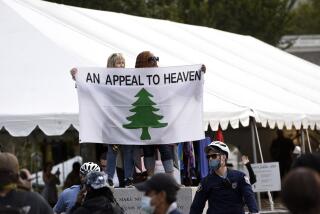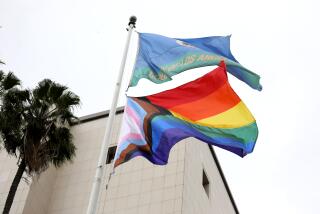Flap Leaves City Red, White and Bruised
A long-simmering debate over lowering the American flag has prompted Glendale officials to create a residents committee to find less divisive ways of commemorating the Armenian genocide.
The city is sending out letters this week to about 40 residents inviting them to join the commemoration committee and a second one that will establish a Day of Unity celebrating Glendale’s cultural diversity.
The panels grew out of a controversy over Mayor Gus Gomez’s decision in April to lower the American flag on city buildings in observance of the genocide. Although two previous mayors had ordered the flags lowered, with little opposition, Gomez’s action drew harsh criticism from some residents, who ultimately launched a recall drive against him.
Last week, leaders of the effort to oust Gomez abandoned their campaign after failing to submit the required number of voter signatures by the Dec. 26 deadline. They had argued that Gomez had violated the U.S. flag code because only the president and governor may order the stars and stripes lowered.
Gomez’s supporters, however, said growing anti-Armenian sentiments were behind the recall initiative. About a third of Glendale’s 190,000 residents are of Armenian descent, the highest proportion of any city outside Armenia, and they consider April 24 one of the most significant days of the year.
On that date in 1915, Turkish soldiers allegedly rounded up and massacred hundreds of thousands of Armenian artists, leaders and intellectuals to “cleanse” the country of non-Muslims.
After Gomez came under fire, the Glendale City Council formed a citizens advisory group to make recommendations for future tributes. The group suggested dedicating a room at the public library to the genocide and other crimes against humanity, staging memorial events during the week of April 24 and establishing a unity day.
The two new committees, each with about 20 members, will develop proposals.
Gomez said he has been vindicated by the recall campaign’s failure. “It is my feeling that the community will feel the genocide has been properly recognized,” he said.
Councilman Rafi Manoukian, who is likely to succeed Gomez as the council-appointed mayor, would not say whether he will lower the flag April 24. He said he does not expect to be asked to do so.
“I don’t think I’ll be faced with that decision if [the genocide] can be observed in ways that will be reflective of the community,” Manoukian said.
Levon Marashlian, an Armenian American who served on the advisory group, said there are better ways to recognize April 24 than lowering the flag, such as library exhibits, a lecture series and other educational programs.
“Most people in Glendale want to acknowledge the day,” said Marashlian, a history instructor at Glendale Community College. “The city’s heart was in the right place, but lowering the flag aroused unnecessary controversy.”
The recall activists--who began circulating petitions in July--have abandoned the effort because Gomez will no longer be mayor next year and they doubt the flags will be lowered again, said campaign leader Joe Mandoky.
The drive needed 13,565 signatures to place the recall on the ballot. Mandoky would not say how many were collected.
Gomez said the petition drive just failed.
*
Times staff writer Kristina Sauerwein contributed to this report.
More to Read
Sign up for Essential California
The most important California stories and recommendations in your inbox every morning.
You may occasionally receive promotional content from the Los Angeles Times.










